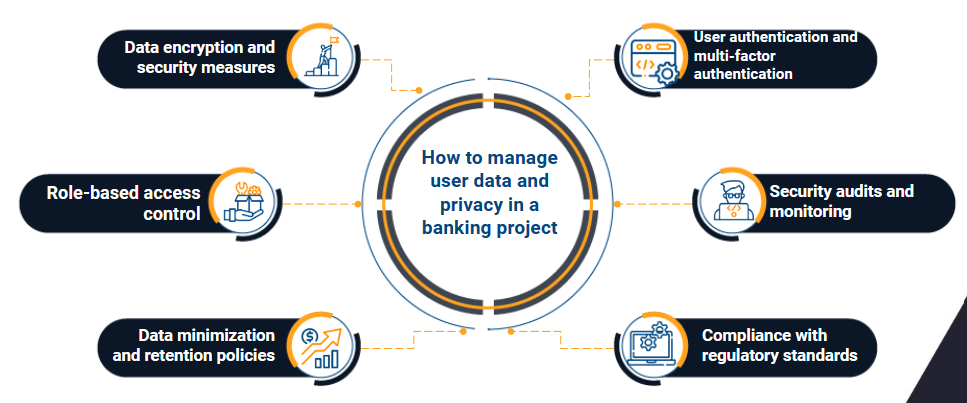.png)
Data security and privacy in Fintech: best practices
December 22, 2023
Table of contents
Quick Access

In the rapidly evolving Fintech landscape, where innovation is reshaping the way we handle transactions and manage finances, the importance of data security and privacy cannot be understated.
Fintech companies handle large amounts of sensitive financial information, making them prime targets for cyber threats. To safeguard customer trust and meet regulatory standards, it is imperative to adopt robust data security and privacy measures.
Below are some best practices fintech companies should consider:
Data security and privacy in Fintech
1. Encryption is key
Implementing strong encryption protocols is the foundation of data security. Fintech companies should encrypt data both in transit and at rest. Using end-to-end encryption ensures that even if data is intercepted during transmission, it remains indecipherable to unauthorized entities. Additionally, encrypting stored data adds an additional layer of protection against potential breaches.
2. Multi-factor authentication (MFA)
Implementing MFA is a crucial step in preventing unauthorized access to sensitive financial data. By requiring users to authenticate using multiple verification methods, such as passwords, biometrics, or one-time codes, fintech companies can significantly improve the security of user accounts and transactions.
3. Periodic security audits and penetration tests
Conducting regular security audits and penetration tests is essential to identify vulnerabilities in systems and applications. By proactively assessing potential weaknesses, fintech companies can address security issues before they are exploited by malicious actors. Regular testing should cover all aspects of the infrastructure, including networks, applications, and databases.
4. Data minimization and retention policies
Adopting a data minimization strategy means collecting only the information necessary for business purposes. Fintech companies should establish clear data retention policies to avoid storing unnecessary customer data. By limiting the data retained, companies reduce the risk and impact of data breaches while demonstrating a commitment to privacy.

5. Employee training and awareness
Employees play a crucial role in maintaining data security. Providing comprehensive training on security protocols and raising awareness of potential threats can help prevent human errors that can lead to data breaches. Regularly updating employees on the latest security practices ensures an alert and informed workforce.
6. Compliance with Regulatory Standards
Fintech companies must stay abreast of evolving data protection regulations and ensure compliance with industry-specific standards. Depending on the geographic scope of operations, this may include compliance with regulations such as GDPR, HIPAA, or specific financial industry guidelines. Compliance not only protects customer data, but also helps build trust with regulators.
7. Secure application development
Since fintech relies heavily on software applications, ensuring the security of these applications is paramount. Employing secure coding practices, conducting regular code reviews, and integrating security into the development lifecycle can help identify and mitigate vulnerabilities before applications are deployed.
8. Incident response plan
Despite strong preventative measures, it is essential to have a well-defined incident response plan. In the event of a security incident, fintech companies should be able to respond quickly and effectively, minimizing the impact on customers and the business. Testing and regularly updating the incident response plan ensures its effectiveness.
In conclusion, as fintech continues to transform the financial landscape, prioritizing data security and privacy is non-negotiable. By implementing these best practices, fintech companies can not only protect sensitive information but also build a reputation for trustworthiness and trustworthiness, ultimately fostering long-term success in the competitive fintech industry.
We recommend you on video
Related Blogs

Steps for software product development
-9.20.37-a.m.png)
Product Design and Development

Tools for Machine Learning

The Best Data Science Tools in 2025

What is Data Science?

